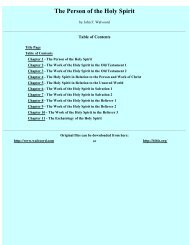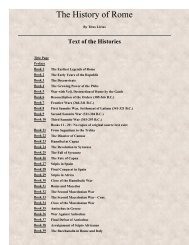Types in Hebrews - Table of Contents - Holy Pig Splash Page
Types in Hebrews - Table of Contents - Holy Pig Splash Page
Types in Hebrews - Table of Contents - Holy Pig Splash Page
Create successful ePaper yourself
Turn your PDF publications into a flip-book with our unique Google optimized e-Paper software.
<strong>Types</strong> <strong>in</strong> <strong>Hebrews</strong><br />
Sir Robert Anderson<br />
CHAPTER 12<br />
HEAVENLY REALITIES<br />
AS already urged, <strong>Hebrews</strong> 13 is probably the "letter <strong>in</strong> few words" to which the twenty-second verse<br />
refers. This has been discussed <strong>in</strong> a preced<strong>in</strong>g page. 1 No careful reader can fail to notice that here the<br />
epistolary style becomes more marked. And warn<strong>in</strong>gs such as those <strong>of</strong> the open<strong>in</strong>g verses aga<strong>in</strong>st<br />
immorality and covetousness appear for the first time. For the dist<strong>in</strong>ctive s<strong>in</strong> with which the Epistle deals<br />
is unbelief, and unbelief <strong>of</strong> the type that savors <strong>of</strong> apostasy, a go<strong>in</strong>g back to Judaism by those who had<br />
accepted Christ as the fulfillment <strong>of</strong> that div<strong>in</strong>e religion. And to that special s<strong>in</strong> the writer reverts at the<br />
seventh verse, a fact which <strong>in</strong>dicates that the change <strong>of</strong> style does not imply change <strong>of</strong> authorship.<br />
The "therefores" and "wherefores" <strong>of</strong> <strong>Hebrews</strong> are important as giv<strong>in</strong>g a clue to the writer’s<br />
"argument." And <strong>Hebrews</strong> 13:13 will guide us to the purpose and mean<strong>in</strong>g <strong>of</strong> the verses which precede<br />
it. The clause beg<strong>in</strong>s by exhort<strong>in</strong>g the Hebrew Christians to imitate the faith <strong>of</strong> those who, <strong>in</strong> the past,<br />
had been "over them <strong>in</strong> the Lord," (1 Thessalonians 5:12) and had m<strong>in</strong>istered the Word among them.<br />
Their strength and stay, whether <strong>in</strong> life or <strong>in</strong> death, was to be found <strong>in</strong> Him to whom perta<strong>in</strong>ed the div<strong>in</strong>e<br />
title <strong>of</strong> the Same, (<strong>Hebrews</strong> 1:12; Psalm 102:27) and who, "yesterday and today and for ever," fulfills the<br />
promise <strong>of</strong> that name. Let them not be carried away then by teach<strong>in</strong>gs foreign 2 to that faith. It is good<br />
that the heart be established by grace and not by religion. 3<br />
Let us keep <strong>in</strong> view that the, practical "objective" here is the exhortation "Let us go forth unto Him<br />
without the camp, bear<strong>in</strong>g His reproach"; for His hav<strong>in</strong>g suffered "without the gate" was a brand <strong>of</strong><br />
<strong>in</strong>famy. And lead<strong>in</strong>g up to this, the Apostle appeals to at typical ord<strong>in</strong>ance <strong>of</strong> their religion, which was as<br />
well known to the humblest peasant as to the ano<strong>in</strong>ted priest - that none could partake <strong>of</strong> the great<br />
sacrifice <strong>of</strong> the Day <strong>of</strong> Atonement, the blood <strong>of</strong> which was carried by the high-priest <strong>in</strong>to the holy place.<br />
So also is there an aspect <strong>of</strong> the sacrifice <strong>of</strong> Christ <strong>in</strong> which His people can have no share. But, as He<br />
exclaimed <strong>in</strong> one <strong>of</strong> the great Messianic Psalms, "Reproach hath broken my heart." (Psalm 69:20) Shall<br />
His people then claim salvation through the Cross and yet refuse to share the reproach <strong>of</strong> the Cross? It<br />
was the religious world that crucified Him - the div<strong>in</strong>e religion <strong>in</strong> its apostasy. And the magnificent<br />
shr<strong>in</strong>e that was the centre and outward emblem <strong>of</strong> that religion was still stand<strong>in</strong>g. That temple was rich<br />
<strong>in</strong> holy memories and glorious truth: how natural then it was for them to turn to it. The Apostle had<br />
already rem<strong>in</strong>ded them that if the patriarchs had been m<strong>in</strong>dful <strong>of</strong> all they had abandoned, they might<br />
have had opportunity to have returned? <strong>Hebrews</strong> 11:15-16) But they were look<strong>in</strong>g for "the city which<br />
hath the foundations." And so it was with the Hebrew Christians. The "way back" was ever open to<br />
them: it was their special snare. And therefore it was not a s<strong>in</strong>gle act <strong>of</strong> renunciation that he here<br />
enjo<strong>in</strong>ed upon them, but the constant attitude and habit <strong>of</strong> the life - an habitual "go<strong>in</strong>g forth unto Him." 4<br />
"For here (he adds) we have not an abid<strong>in</strong>g city, but we seek after the city which is to come."








